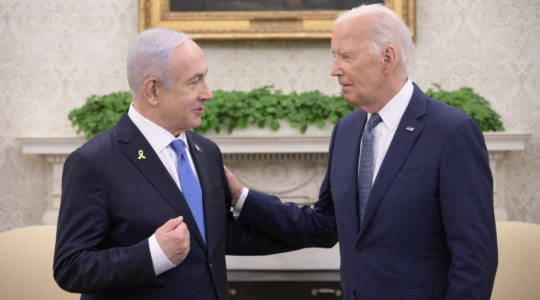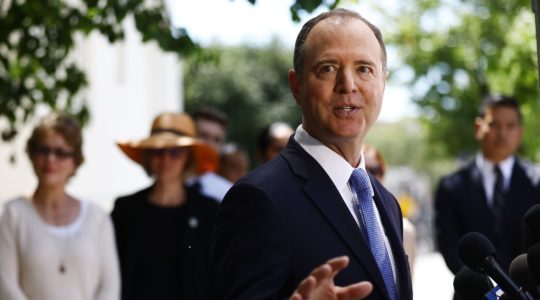JERUSALEM (JTA) – Amid signs that Syria may be preparing for war with Israel this summer, Prime Minister Ehud Olmert reportedly is considering sending secret peace feelers to Damascus.In recent weeks, the signals on war and peace from Damascus have been mixed.On the one hand, President Bashar Assad repeated for the umpteenth time that he wants to negotiate a peace deal. On the other, Syria has been engaged in an unprecedented upgrading of weapons’ systems, heavy fortification building and large-scale troop maneuvers.One interpretation is that the war signals are an attempt to pressure Israel into peace talks. Israeli governments for years have ignored Assad’s calls for dialogue; the show of Syrian military power could be an attempt to concentrate the minds in Jerusalem.If so, the gambit seems to be working.Military intelligence, top-ranking Israeli army officers and some Cabinet ministers reportedly are advising Olmert to check out the possibility of peace talks and thus help to cool what could become a highly inflammable situation.For Olmert, though, the question remains: Is Syria serious about peace, or just about peace talks to relieve international pressure over its ties with Iran and involvement in the assassination of Lebanese Prime Minister Rafiq al-Hariri?The showdown in Lebanon between the Lebanese army and radical
Palestinian gunmen also could impact on the Israel-Syria question. A second, more urgent imponderable on the table: If there are no talks, is Syria ready to go to war to force the issue, the way Egypt and Syria did in 1973?Over the past year, the Syrians reportedly have concluded huge arms deals with Russia. Among the weapons systems purchased are advanced Pantsir S-1 anti-aircraft batteries, long-range Iskander-E ground-to-ground missiles, SU-30 and Mig-29 jets, and state-of-the-art anti-tank missiles.The Syrians are also said to have transferred long-range rockets to Hezbollah that would enable the radical Shi’ite militia to strike at targets in central Israel.On the other hand, Israeli intelligence says the recent large-scale Syrian maneuvers were largely defensive in nature. Moreover, United Nations observers on the Golan Heights deny any irregular buildup of forces by either side. They say the Syrians and the Israelis have less than half the troops they are permitted in the border area by the 1974 Separation of Forces Agreement.Still, the U.N. observers acknowledge that a misreading of the other side’s intentions could easily lead to a flare-up.Some senior Israel Defense Forces officers reckon that if Israel does not open peace talks, Syria might start a terror campaign on the Golan to suck Israel into a confrontation. These officers say the Syrians believe they would be able to use their ground-to-ground missiles to cause widespread damage on the home front.The IDF assessment goes that if there is war, Hezbollah also would open fire, and Iran would help by sending in more weapons and ammunition.Iran’s President Mahmoud Ahmadinejad offered a chilling reminder of his government’s position when he declared Sunday that “with God’s help, the countdown button for the destruction of the Zionist regime has been pushed by the hands of the children of Lebanon and Palestine.”Given the volatility of the situation, the top IDF brass is urging Olmert to send out secret feelers to explore Syria’s position on a peace deal. Transport Minister Shaul Mofaz, a former chief of staff and defense minister, also has been saying it is time to sound out the Syrians.Mofaz, who heads the Israeli team on strategic cooperation with the United States, is scheduled to hold talks this week with senior officials in Washington, where he may well seek American approval for an Israeli move to defuse the potentially explosive Syrian situation.Olmert says some feelers already have been put out. For one, European and Turkish intermediaries assured the Syrians that Israel has no aggressive intentions.They also asked Assad what Olmert sees as the key question: In a state of peace with Israel, after getting back the Golan Heights, would Syria be ready to make a break with Iran and stop supporting Hezbollah and Palestinian rejectionists?According to Olmert aides, the Syrian answer was vague and unsatisfactory. Now, on the advice of the army, the prime minister reportedly is considering a more determined follow-up.After last week’s U.N. decision to set up a tribunal on the Hariri assassination, the Syrians are under more international pressure than ever with regard to their suspected involvement in the murder. This could be another reason for Assad to be more forthcoming over Syrian concessions in return for an effective negotiating framework with Israel.In the showdown in Lebanon, the Lebanese government maintains that the radical fundamentalist al-Fatah al-Islam gunmen in the Nahr al-Bared refugee camp are working for Syria.But even if they are not, the Lebanese army’s assertion of authority by taking on the gunmen could further weaken Syrian influence in Beirut. And that too might persuade Assad to go for a deal with Israel.Conversely, if the showdown leads to further destabilization nationwide, the Syrians may use that as a pretext to strengthen their presence in Lebanon and consequently show less interest in a deal with Israel.In any event, this summer could be a watershed in Israeli-Syrian relations. Even if neither side wants it, war could easily be triggered by an incident in Lebanon or a strategic misunderstanding on the Golan.On the other hand, secret contacts, with the added ingredient of key American commitments to both sides, could pave the way for genuine peace talks and the detaching of Syria from the Iranian axis.Indeed, America’s role, which has been largely negative, could be crucial. If the Americans were to try to underwrite an Israeli-Syrian peace the way they did at Shepherdstown seven years ago, Olmert and Assad might be able to do business.The next key meeting on the issue could be June 19, when Olmert meets President Bush in Washington.

Help ensure Jewish news remains accessible to all. Your donation to the Jewish Telegraphic Agency powers the trusted journalism that has connected Jewish communities worldwide for more than 100 years. With your help, JTA can continue to deliver vital news and insights. Donate today.





